Literary rating: ★★★
Kick-butt quotient: ☆☆
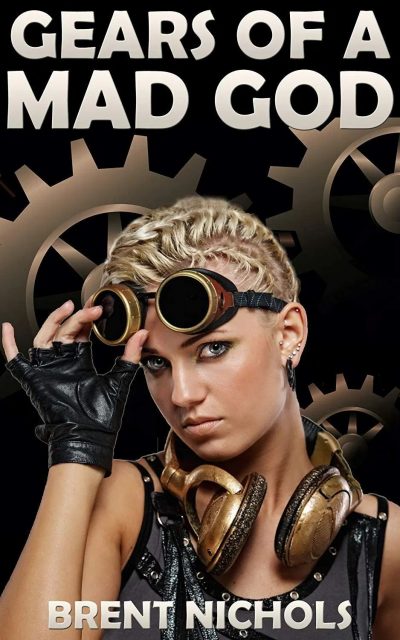 Early 20th-century pulp-fiction author Howard Philips Lovecraft created a substantial corpus of writing, mainly in the short story format and mostly in the form of horrific science fiction which in many ways reads like classic supernatural fiction. The most enduring body of his work has been the novellas and stories making up what has come to be called his Cthulhu Mythos, based on the premise that the prehistoric Earth was dominated by the Great Old Ones, or Elder Gods, malevolent and repulsive, but very powerful and dangerous, alien beings who were ultimately dethroned by another alien race, and whose hidden remnants want to regain their past dominance. A number of Lovecraft works present the idea that these beings have an evil and often murderous cult of human worshipers, handed down from the dawn of mankind, who seek to further their return to power. Numerous later writers have been inspired by HPL’s example to create their own pastiches and spin-offs of the Mythos. Brent Nichols’ self-published Gears of a Mad God novella series (there are six in all), of which this book –set in Canada in May 1921, mainly on Vancouver Island– is the opener, is one of these spin-offs. One of my Goodreads friends gave this one a favorable review; and since I’m a Lovecraft fan and the novella is free for Kindle and relatively short at 98 pages, I downloaded it.
Early 20th-century pulp-fiction author Howard Philips Lovecraft created a substantial corpus of writing, mainly in the short story format and mostly in the form of horrific science fiction which in many ways reads like classic supernatural fiction. The most enduring body of his work has been the novellas and stories making up what has come to be called his Cthulhu Mythos, based on the premise that the prehistoric Earth was dominated by the Great Old Ones, or Elder Gods, malevolent and repulsive, but very powerful and dangerous, alien beings who were ultimately dethroned by another alien race, and whose hidden remnants want to regain their past dominance. A number of Lovecraft works present the idea that these beings have an evil and often murderous cult of human worshipers, handed down from the dawn of mankind, who seek to further their return to power. Numerous later writers have been inspired by HPL’s example to create their own pastiches and spin-offs of the Mythos. Brent Nichols’ self-published Gears of a Mad God novella series (there are six in all), of which this book –set in Canada in May 1921, mainly on Vancouver Island– is the opener, is one of these spin-offs. One of my Goodreads friends gave this one a favorable review; and since I’m a Lovecraft fan and the novella is free for Kindle and relatively short at 98 pages, I downloaded it.
An important point to note is that, while HPL’s Mythos supplies the premise here, Nichols’ prose style is nothing like the older writer’s “purple prose;” his diction is modern, straightforward and direct, with no stylistic embellishment and a minimum of description. Another is that the focus here is exclusively on the cultists of the Great Old Ones, and the effort to counter them; the sinister objects of their devotion are strictly off-stage. (For all that we see here, the Great Old Ones could just as well be figments of the cultists’ imagination.) Also unlike Lovecraft, even though there are a couple of instances here of characters driven mad by exposure to the cult’s secrets, Nichols eschews existential pessimist sermonizing and “morals of the story,” and doesn’t harp on the idea that unvarnished exposure to reality would actually be enough to drive virtually anybody insane. Of course, our protagonist/viewpoint character here is female, something which is never found in HPL’s own work. So despite the inspiration, the effect of reading this is much different from the works of the original Cthulhu canon. The title also misuses the term “steampunk” (it features a heroine who’s mechanically oriented, but that doesn’t make it steampunk!), and the phrase “Gears of a Mad God” makes no particular sense –some machinery here has gears, but they aren’t owned by any Elder God, mad or sane, and they aren’t focal to the story.
On the positive side, the tale is fast-paced, held my interest, and is frequently exciting and suspenseful; I felt that Nichols handles action scenes well. There is a clearly-drawn moral dimension to the conflict; Colleen makes choices that involve putting protection of others before self-interest, and her moral struggles with lethal force are realistic for a young woman with no combat training or experience. She does pick up fighting skill by use, and her mechanical ability is a nice touch (though clock-making and repair actually isn’t as credible a source of physical strength and knowledge of large-scale mechanical processes as say, auto repair would have been).
The plot is linear, with no particular twists (I actually envisioned one I was sure was coming, and was quite surprised when it didn’t materialize!). On the negative side, the character development is not deep (Colleen is the best-developed character, but she’s still not very fully realized), there’s not a lot of texture, and I wouldn’t say there’s a strong sense of place either in her native Toronto or in Victoria. (I did learn that Vancouver, British Columbia is NOT on Vancouver Island –but Victoria is!) But unlike one reviewer, I didn’t find the U.S. Bureau of Investigation agents and their Canadian liaisons ineffectual; and I didn’t have a problem with squaring the arrival of characters on the island with the ferry schedule –I made the assumption that their appearance in the story was not necessarily always virtually identical to their landing time. (But I did have a quibble with the idea that the U.S. President had contacted the Canadian Prime Minister “last year” –the President in 1920 was Woodrow Wilson, who was then pretty much non-functional due to his physical and nervous breakdown.) IMO, the emphasis on the boyfriend’s “antediluvian attitude” (to quote one review) near the end was necessary to set up a significant choice by the heroine.
Overall, I liked this tale. But even though it’s obviously only the beginning of a larger story arc, and the ending, while not a cliff-hanger as such, is clearly meant to lead into further confrontation with the cult, I’m still not captivated enough by the characters or the story to invest in buying the sequels.
Note: There’s no sexual content (Colleen and her boyfriend, at one point, lay down on a bed with their clothes on and get some needed sleep, but they don’t do anything else), and no bad language beyond a d-word and two h-words.
Author: Brent Nichols
Publisher: Self-published; available through Amazon, both for Kindle (free!) and as a printed book.
Book 1 of 6 in the Gears of a Mad God Book series
A version of this review previously appeared on Goodreads.





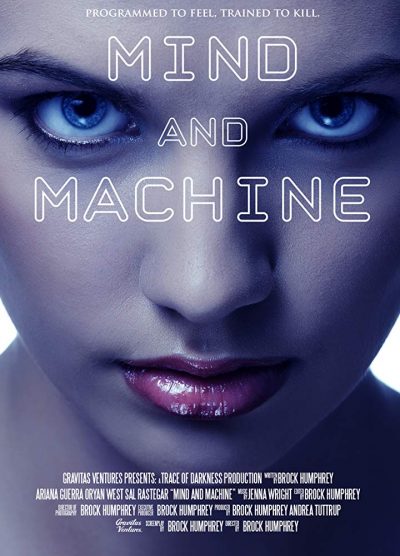 Intelligence without morality to govern it, is psychopathy. So what happens when you create an intelligent machine, but deliberately avoid installing any kind of moral compass? It’s an interesting idea for a film. Not that you’d know it from this unconvincing effort, which sucks the potential out of it. In this near-future – it’s set in 2024, close enough to now, no actual work is required on the part of the makers – androids have become part of everyday society in many roles. Crime boss Isaac Lynch (Restegar) orders technician Leo Cameron (West) to make one without a conscience, so that it can be used as an assassin, saving those pesky hitman fees. Only Leo crafts the robot, Maya (Guerra), in the image of his late wife. On the plus side: he gets to see his wife again. On the other hand: she’s an amoral killer. Didn’t think that through too well, did he?
Intelligence without morality to govern it, is psychopathy. So what happens when you create an intelligent machine, but deliberately avoid installing any kind of moral compass? It’s an interesting idea for a film. Not that you’d know it from this unconvincing effort, which sucks the potential out of it. In this near-future – it’s set in 2024, close enough to now, no actual work is required on the part of the makers – androids have become part of everyday society in many roles. Crime boss Isaac Lynch (Restegar) orders technician Leo Cameron (West) to make one without a conscience, so that it can be used as an assassin, saving those pesky hitman fees. Only Leo crafts the robot, Maya (Guerra), in the image of his late wife. On the plus side: he gets to see his wife again. On the other hand: she’s an amoral killer. Didn’t think that through too well, did he? Coming in on a wave of hype, e.g. “The Best Indie Science Fiction Movie Since Moon“, I guess I should have listened – because I didn’t think Moon was
Coming in on a wave of hype, e.g. “The Best Indie Science Fiction Movie Since Moon“, I guess I should have listened – because I didn’t think Moon was 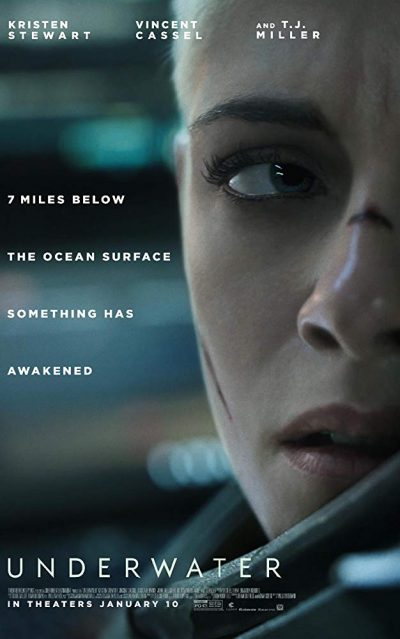 You know the story: A team of experts in a closed contained space, having to deal with ugly monsters and struggling to survive. The blue-print of this variation on Agatha Christie’s And Then There Were None (better known as: Ten Little Indians) was obviously the classic
You know the story: A team of experts in a closed contained space, having to deal with ugly monsters and struggling to survive. The blue-print of this variation on Agatha Christie’s And Then There Were None (better known as: Ten Little Indians) was obviously the classic 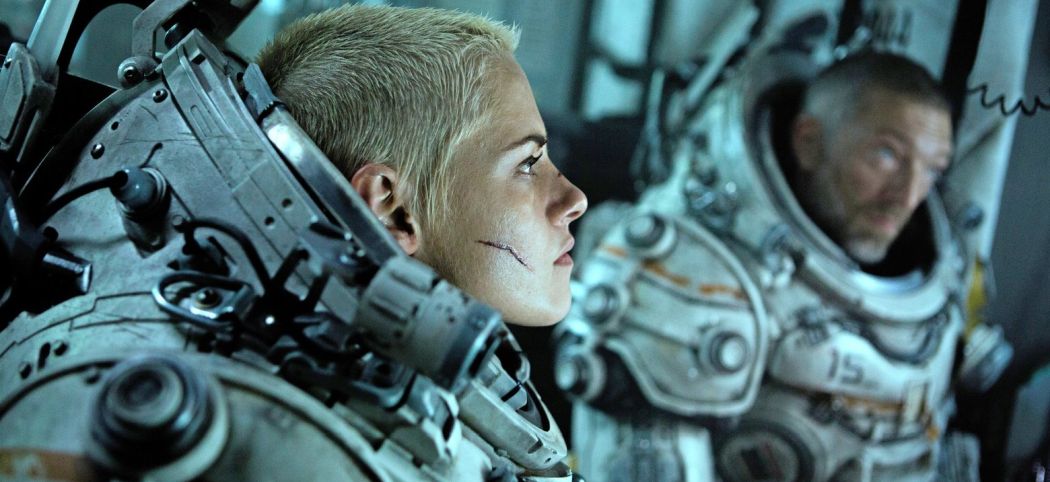
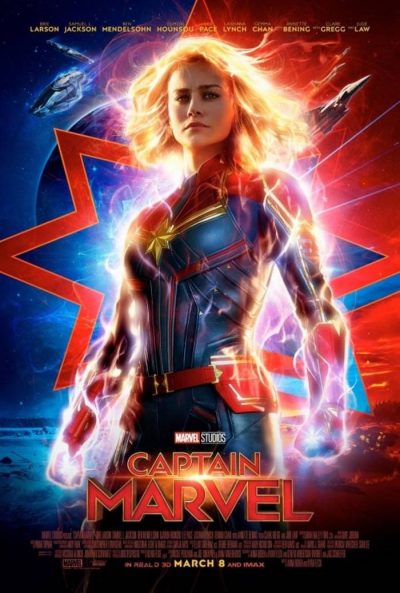 I had a couple of potential concerns going into this. Firstly, my general unfamiliarity with the Marvel Cinematic Universe. This was film #21 in their Infinity Saga. I had seen seven. Would this be like trying to follow Game of Thrones‘s penultimate episode, after having missed two-thirds of what preceded it? Secondly, Brie Larson’s press complaints about movie critics being “overwhelmingly white male.” Yep, guilty as charged, m’lord. Would this questionable attitude – that your skin colour and genital configuration matter more than what you do or say – carry over into the movie?
I had a couple of potential concerns going into this. Firstly, my general unfamiliarity with the Marvel Cinematic Universe. This was film #21 in their Infinity Saga. I had seen seven. Would this be like trying to follow Game of Thrones‘s penultimate episode, after having missed two-thirds of what preceded it? Secondly, Brie Larson’s press complaints about movie critics being “overwhelmingly white male.” Yep, guilty as charged, m’lord. Would this questionable attitude – that your skin colour and genital configuration matter more than what you do or say – carry over into the movie?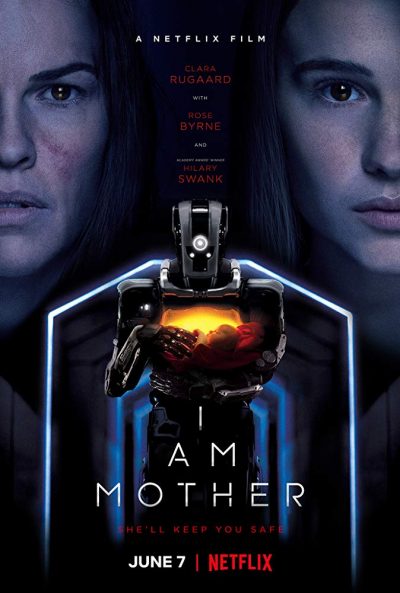 After an extinction-event has turned Earth uninhabitable, an underground “ark” holds thousands of human embryos, overseen by a robotic Mother (voiced by Byrne, performed by Hawker). One embryo is brought to fruition, becoming Daughter (Rugaard, resembling a young Jennifer Garner), who grows up into a young woman, educated by Mother to believe she’s alone on the planet. But she begins to doubt what Mother tells her, and these doubts are confirmed when another, older woman (Swank) shows up. Let in by Daughter, she tells tales of humanity outside struggling for survival against robot killers. Everything Daughter has been told is a lie. Or is the new arrival telling the whole truth either?
After an extinction-event has turned Earth uninhabitable, an underground “ark” holds thousands of human embryos, overseen by a robotic Mother (voiced by Byrne, performed by Hawker). One embryo is brought to fruition, becoming Daughter (Rugaard, resembling a young Jennifer Garner), who grows up into a young woman, educated by Mother to believe she’s alone on the planet. But she begins to doubt what Mother tells her, and these doubts are confirmed when another, older woman (Swank) shows up. Let in by Daughter, she tells tales of humanity outside struggling for survival against robot killers. Everything Daughter has been told is a lie. Or is the new arrival telling the whole truth either?
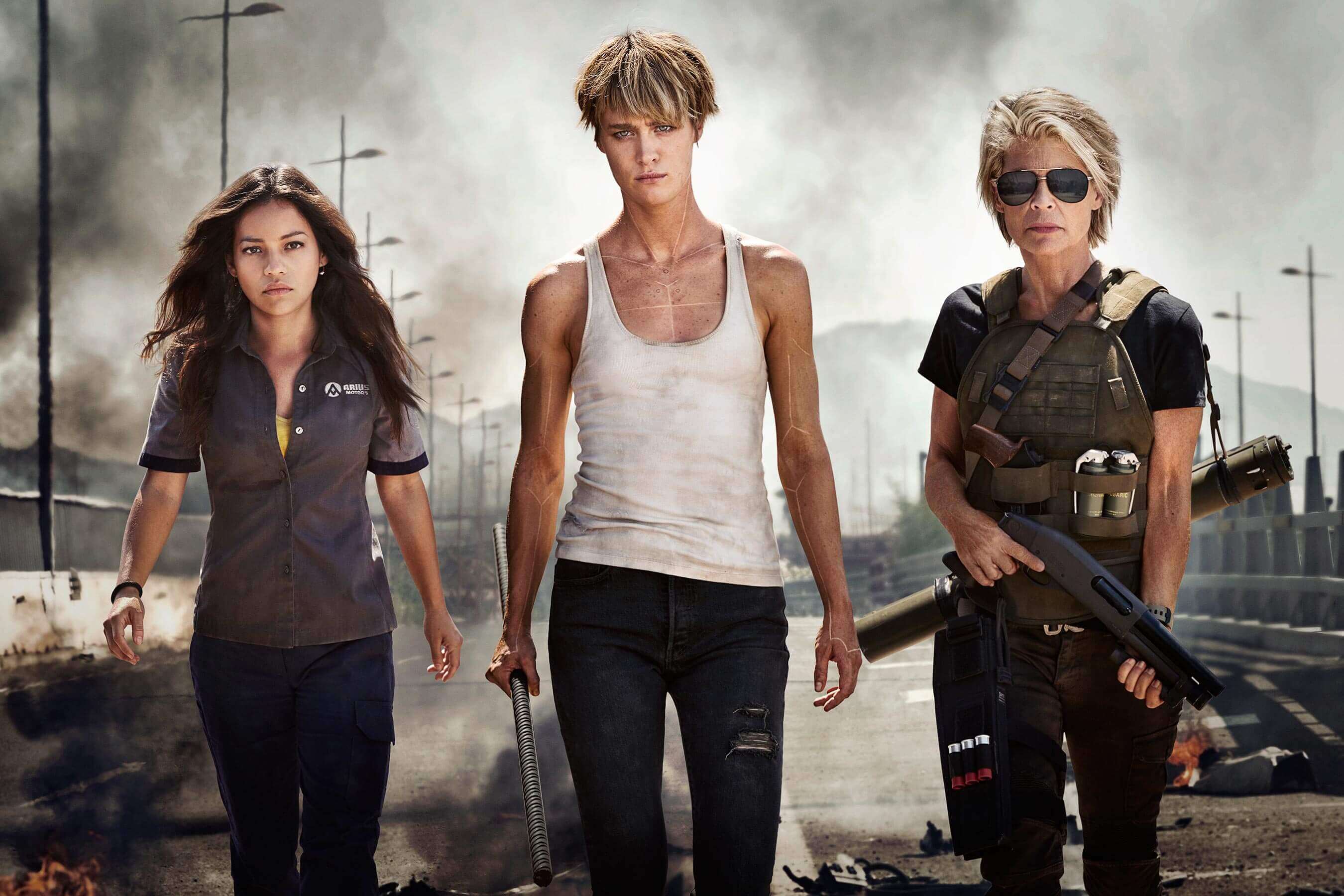 ★★½
★★½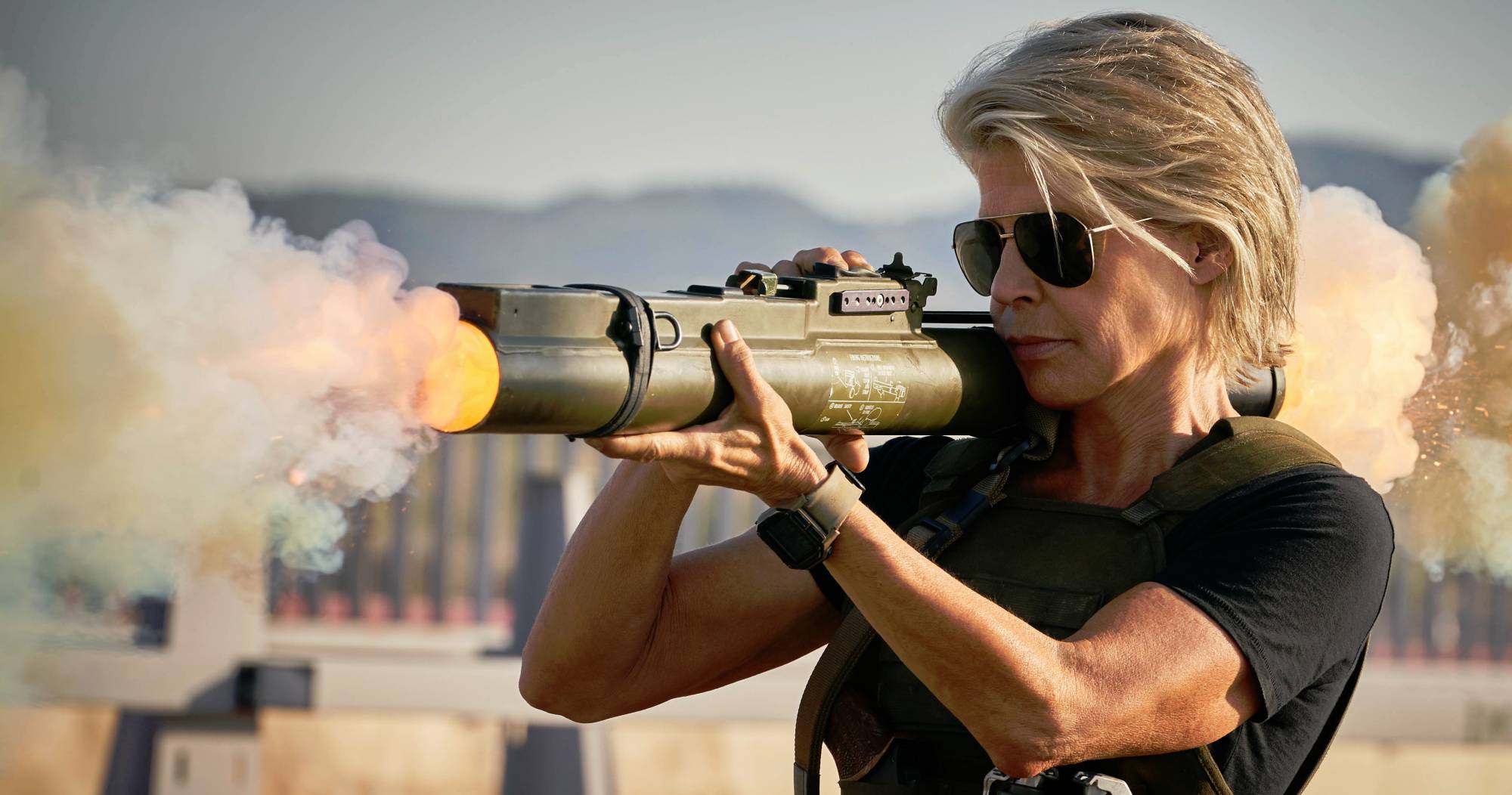
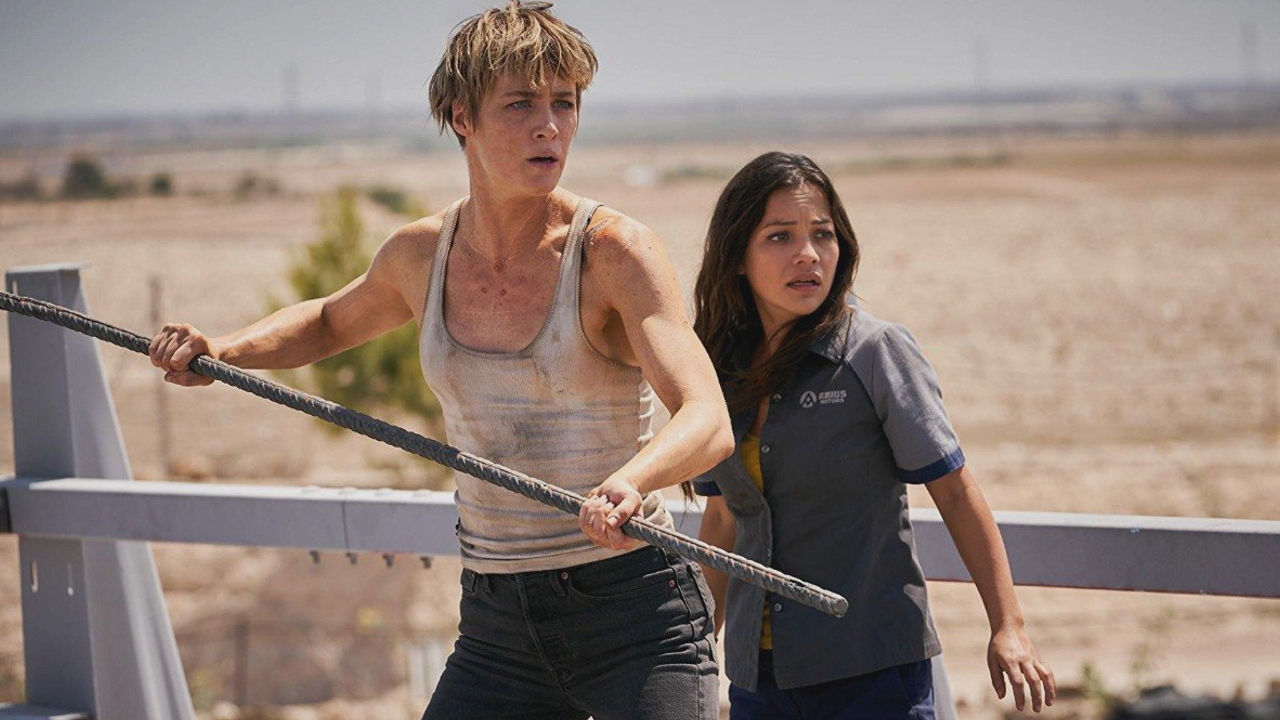
 A solid enough entry in the Jap-splat genre, this benefits mostly from a winning central performance from Uchida as the title character, Giko Nokomura. Her family are in the demolition business, which is at least a token gesture towards explaining the F-sized chainsaw she carries everywhere – initially in a guitar case! She’s a bit of a delinquent, harking back to the sukeban movies of the sixties like
A solid enough entry in the Jap-splat genre, this benefits mostly from a winning central performance from Uchida as the title character, Giko Nokomura. Her family are in the demolition business, which is at least a token gesture towards explaining the F-sized chainsaw she carries everywhere – initially in a guitar case! She’s a bit of a delinquent, harking back to the sukeban movies of the sixties like 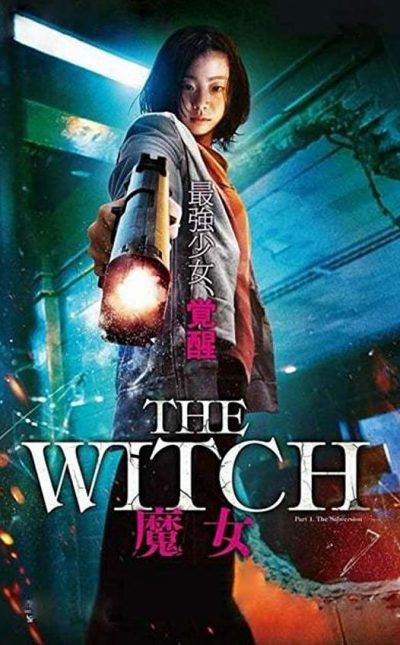 The first in an intended trilogy, this stands on its own reasonably well, balancing between tying up the loose ends and leaving the future uncertain. The heroine is Ja-Yoon (Kim), who begins by escaping from a shadowy, quasi-governmental facility as a raw eight-year-old, despite being hunted by the woman in charge, Dr. Baek (Jo) and her minions. She is found by husband and wife farmers, and they adopt Ja-Yoon, who has no apparent memory of her early life as their own. Ten years later, with Mom suffering from Alzheimer’s, and the farm struggling financially, Ja-Yoon enters a nationwide singing contest. However, the resulting attention brings her firmly back on the radar of Dr. Baek and Nobleman (Choi), the other survivor from that night a decade ago. The not-so-good doctor won’t let Ja-Yoon escape this time.
The first in an intended trilogy, this stands on its own reasonably well, balancing between tying up the loose ends and leaving the future uncertain. The heroine is Ja-Yoon (Kim), who begins by escaping from a shadowy, quasi-governmental facility as a raw eight-year-old, despite being hunted by the woman in charge, Dr. Baek (Jo) and her minions. She is found by husband and wife farmers, and they adopt Ja-Yoon, who has no apparent memory of her early life as their own. Ten years later, with Mom suffering from Alzheimer’s, and the farm struggling financially, Ja-Yoon enters a nationwide singing contest. However, the resulting attention brings her firmly back on the radar of Dr. Baek and Nobleman (Choi), the other survivor from that night a decade ago. The not-so-good doctor won’t let Ja-Yoon escape this time.